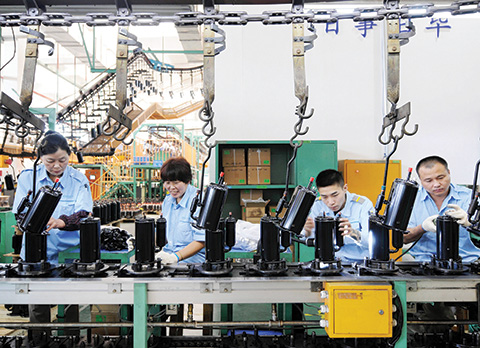 (FILES) This file picture taken on April 19, 2018 shows employees working on the production line for domestic appliances at a factory in Jiujiang in China's central Jiangxi province. - AFP
(FILES) This file picture taken on April 19, 2018 shows employees working on the production line for domestic appliances at a factory in Jiujiang in China's central Jiangxi province. - AFP
BEIJING: China said yesterday it wanted to avoid an escalation of trade tensions with the United States, as the two sides held new talks and Beijing decided to lower some tariffs. The overture came two days after the White House said its planned trade sanctions against China were still in the works despite the announcement of a truce following a previous round of talks earlier in May. China has threatened to hit back with tit-for-tat tariffs on tens of billions of dollars in US goods.
A 50-strong US delegation arrived in Beijing on Wednesday for follow-up meetings, Chinese commerce ministry spokesman Gao Feng said, without proving more details. "We hope that China and US economic and trade cooperation can benefit people in both countries, and we are not willing to see trade frictions escalate," Gao told a regular press briefing. The delegation is laying the groundwork for a weekend visit by US Commerce Secretary Wilbur Ross.
The Trump administration said Tuesday that US sanctions announced in March - including restrictions on Chinese investment, export controls and 25 percent tariffs on as much as $50 billion in Chinese tech exports - remain under development. Gao slammed the proposal, saying US measures to implement investment restrictions and export controls against China "do not conform with the basic principles and spirits of the WTO (World Trade Organization)". "China will carefully evaluate the US measures and relevant impact and retain its rights to adopt relative measures."
Separately, the Chinese government announced in a statement late Wednesday that it would further cut import tariffs on daily consumer goods from July 1. The average tariff on clothing, shoes and hats, kitchenware, and sports and fitness supplies will be reduced from 15.9 percent to 7.1 percent. The rate for home appliances such as washing machines and refrigerators will be lowered from 20.5 percent to eight percent.
Gao said China will also publish a "negative list" of foreign investment by June 30 to ease restrictions in fields including energy, resources, infrastructure and transportation. A negative list includes all the industries with foreign investment restrictions. Beijing previously said it would relax restrictions on foreign investment in automobiles, shipbuilding and aircraft firms.
At a meeting Wednesday chaired by Premier Li Keqiang, the State Council - or cabinet - also decided that China would widen market access through more foreign investor-friendly measures, according to the official Xinhua news agency. "We should raise our innovation capacity in the new round of opening up and see that all intellectual property be fully protected," Li said. "No forced technology transfer will ever be imposed on foreign-invested enterprises and IPR (intellectual property rights) infringements will be penalized to the full extent of the law."
Donald Trump has accused China of forcing US firms to hand over their industrial secrets to Chinese firms in order to do business in the country, a charge that Beijing has rejected. In other measures announced by Xinhua, overseas traders will be encouraged to participate in crude oil and iron ore futures trading. Severe measures will be taken to punish infringements, counterfeiting, commercial secret violators and trademark squatters.
Separately, activity in China's factories expanded at its fastest pace for eight months in May, official data showed Thursday, as demand at home and overseas improved despite brewing trade tensions with the United States. The purchasing managers index came in at 51.9, up from 51.4 last month, the National Bureau of Statistics (NBS) said, in line with a Bloomberg News survey.
The reading, the first monthly economic indicator to gauge the world's second largest economy, was well above the 50-point mark that separates expansion from contraction. NBS analyst Zhao Qinghe said in a statement that high-tech manufacturing and improved export orders both contributed to the growth. The May reading marks the fastest rate of expansion since September despite US President Donald Trump's threats to impose tariffs on China, and Beijing's vows to hit back.
The rise in new export orders "is perhaps due to frontloading by importers in fear of a possible trade war", Nomura chief China economist Lu Ting said in a research note. Capital Economics China economist Julian Evans-Pritchard warned that the growth may not be sustainable. "It appears to mostly reflect a temporary boost to industrial output from the easing of pollution controls rather than a turnaround in underlying demand," he said. China curbed activity in heavy industries in the country's northeast during winter months in an effort to reduce surplus capacity and lessen the heavy smog that typically blankets the region. -AFP




